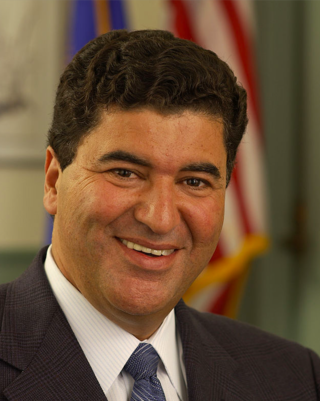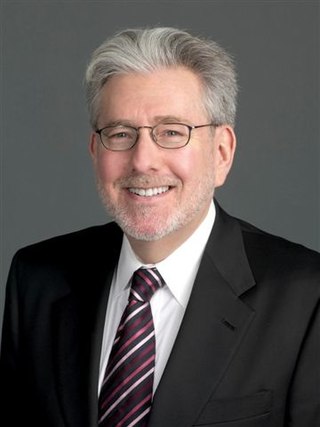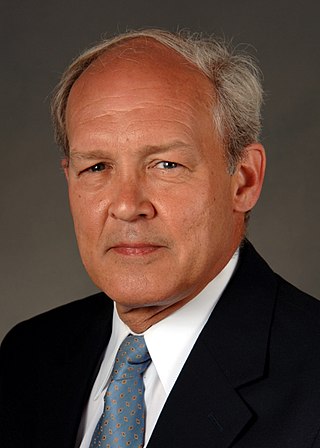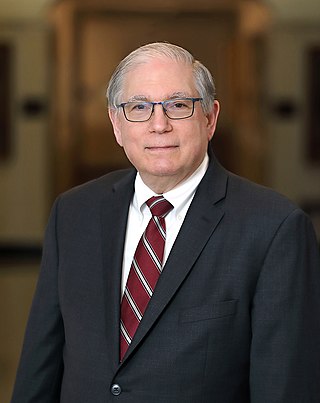Related Research Articles

The National Institutes of Health, commonly referred to as NIH, is the primary agency of the United States government responsible for biomedical and public health research. It was founded in the late 1880s and is now part of the United States Department of Health and Human Services. Many NIH facilities are located in Bethesda, Maryland, and other nearby suburbs of the Washington metropolitan area, with other primary facilities in the Research Triangle Park in North Carolina and smaller satellite facilities located around the United States. The NIH conducts its own scientific research through the NIH Intramural Research Program (IRP) and provides major biomedical research funding to non-NIH research facilities through its Extramural Research Program.
The Substance Abuse and Mental Health Services Administration is a branch of the U.S. Department of Health and Human Services. SAMHSA is charged with improving the quality and availability of treatment and rehabilitative services in order to reduce illness, death, disability, and the cost to society resulting from substance abuse and mental illnesses. The Administrator of SAMHSA reports directly to the Secretary of the U.S. Department of Health and Human Services. SAMHSA's headquarters building is located outside of Rockville, Maryland.
The National Cancer Institute (NCI) coordinates the United States National Cancer Program and is part of the National Institutes of Health (NIH), which is one of eleven agencies that are part of the U.S. Department of Health and Human Services. The NCI conducts and supports research, training, health information dissemination, and other activities related to the causes, prevention, diagnosis, and treatment of cancer; the supportive care of cancer patients and their families; and cancer survivorship.
The Eunice Kennedy Shriver National Institute of Child Health and Human Development (NICHD) is one of the National Institutes of Health (NIH) in the United States Department of Health and Human Services. It supports and conducts research aimed at improving the health of children, adults, families, and communities, including:

Elias Zerhouni is an Algerian-born American scientist, radiologist and biomedical engineer.
The Office of AIDS Research of the National Institutes of Health (NIH) of the United States of America develops guidelines for the use of antiretroviral agents in HIV-1-infected adults and adolescents. OARAC is an advisory group to the Office of AIDS Research. The Office of AIDS Research is an office of the National Institutes of Health's Division of Program Coordination, Planning, and Strategic Initiatives which in turn is governed by the Office of the Director of the NIH.

Alan Krensky is executive for development at Northwestern Medicine and vice dean for development and alumni relations at Northwestern's Feinberg School of Medicine. He was previously senior investigator in the Laboratory of Cellular and Molecular Biology at the National Institutes of Health (NIH) and served as the first director of the Office of Portfolio Analysis and Strategic Initiatives (OPASI) and a deputy director of NIH. He was Associate Dean for Children’s Health and the Shelagh Galligan Professor of Pediatrics at Stanford University.

Eric D. Green is an American genomics researcher who had significant involvement in the Human Genome Project. He is the director of the National Human Genome Research Institute (NHGRI) at the National Institutes of Health (NIH), a position he has held since 2009.
Lana Skirboll is the former director of the National Institutes of Health Office of Science Policy.

The NIH Intramural Research Program (IRP) is the internal research program of the National Institutes of Health (NIH), known for its synergistic approach to biomedical science. With 1,200 Principal Investigators and over 4,000 Postdoctoral Fellows conducting basic, translational, and clinical research, the NIH Intramural Research Program is the largest biomedical research institution on earth. The unique funding environment of the IRP facilitates opportunities to conduct both long-term and high-impact science that would otherwise be difficult to undertake. With rigorous external reviews ensuring that only the most outstanding research secures funding, the IRP is responsible for many scientific accomplishments, including the discovery of fluoride to prevent tooth decay, the use of lithium to manage bipolar disorder, and the creation of vaccines against hepatitis, Hemophilus influenzae (Hib), and human papillomavirus (HPV). In addition, the IRP has also produced or trained 21 Nobel Prize-winning scientists.
The National Institutes of Health Common Fund is an initiative of the National Institutes of Health (NIH) aimed at supporting research collaboration between two or more NIH institutes and centers (ICs). The fund offers flexible support for cutting edge, multidisciplinary, multi-investigator and higher risk research. It is intended to streamline US biomedical research and make it more flexible in response to society's health needs. The high-impact programs it supports are known collectively as the "NIH Roadmap for Medical Research". It is coordinated by the Office of Strategic Coordination, one of the six offices of the Division of Program Coordination, Planning, and Strategic Initiatives (DPCPSI) within the Office of the Director.
The National Institute of Diabetes and Digestive and Kidney Diseases (NIDDK) is part of the United States National Institutes of Health, which in turn is part of the Department of Health and Human Services. NIDDK is approximately the fifth-largest of the 27 NIH institutes. The institute's mission is to support research, training, and communication with the public in the topic areas of "diabetes and other endocrine and metabolic diseases; digestive diseases, nutritional disorders, and obesity; and kidney, urologic, and hematologic diseases". As of 2021, the Director of the institute is Griffin P. Rodgers, who assumed the position on an acting basis in 2006 and on a permanent basis in 2007.
The Office of the Assistant Secretary for Planning and Evaluation (ASPE) is the principal advisory group to the United States Secretary of the Department of Health and Human Services (HHS) on policy development and provides coordination and support for HHS's strategic and policy planning, planning and development of legislation, program evaluation, data gathering, policy-related research, and regulatory program.

Kathryn C. Zoon is a U.S.-based immunologist, elected to the U.S. Institute of Medicine in 2002 for her research on human interferons. She is the former scientific director of the Division of Intramural Research at the National Institute of Allergy and Infectious Diseases (NIAID), National Institutes of Health (NIH) in Bethesda, Maryland. From 1992 to 2002, Zoon was director of the FDA Center for Biologics Evaluation and Research (CBER).
NIH Office of Science Policy is the primary advisor to the Director of the NIH on matters of biomedical research policy issues that are of significance to the agency, the research community, and the public. The office also works with stakeholders within and outside of NIH to develop policies that promote progress in the life sciences. The current Acting NIH Associate Director for Science Policy and Acting Director of the NIH Office of Science Policy is Lyric Jorgenson, Ph.D.

James M. Anderson is an American Professor of Medicine and Cell Biology and is a Chief of Section of Digestive Diseases at the Yale School of Medicine. Anderson is also a director of the Division of Program Coordination, Planning, and Strategic Initiatives at the National Institutes of Health.

Hugh Auchincloss, Jr. is an American immunologist and physician serving as the acting director of the National Institute of Allergy and Infectious Diseases since 2023. He previously served as the principal deputy director between 2006 and 2022. He was previously a transplant surgeon and professor of surgery at Harvard Medical School, and researched at Massachusetts General Hospital for 17 years.

Cynthia "Cee" Barnes-Boyd was an American academic administrator, professor, and nurse. She was the director of the Office of Community Engagement and Neighborhood Health Partnerships at the University of Illinois Chicago (UIC), and executive director of the University of Illinois Mile Square Health Center. She was a clinical associate professor of community health at the UIC College of Nursing, and a clinical associate professor of community health sciences at the UIC School of Public Health.

Lawrence A. Tabak is an American dentist and biomedical scientist serving as the principal deputy director of the National Institutes of Health. He served as acting director from 2021 to 2023. Previously he was the director of the National Institute of Dental and Craniofacial Research from 2000 to 2010.
References
- ↑ NIH Reform Act of 2006
- 1 2 "About DPCPSI". US Department of Health and Human Services. Retrieved July 2, 2017.
 This article incorporates text from this source, which is in the public domain .
This article incorporates text from this source, which is in the public domain . - ↑ "NIH Organizational Chart" (PDF). NIH. Retrieved March 17, 2019.
- ↑ "Anderson Appointed DPCPSI Director". Archived from the original on 2018-11-09. Retrieved 2018-11-08.
- ↑ NIH Council of Councils Charter